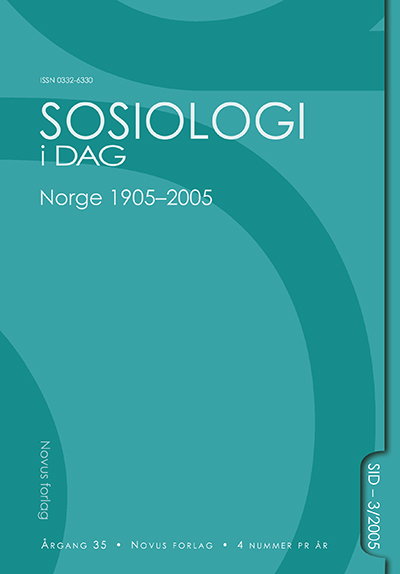Sammendrag
Abstract
The union between Sweden and Norway was established in 1814 as a consequence of royal conquest in the wake of the European turbulence of the Napoleonic wars, and was liquidated peacefully in 1905 after a Nor-wegian proclamation and subsequent negotiations. The peaceful liquidation after negotiation came about after a decision which in Norway was described as the King's abdication and in Sweden as a Norwegian coup d'état. There is a century later a shimmer of self-evidence over this peaceful liquidation in 1905. However, against the backdrop of the widely different opinions about how and why the union was liquidated, this view of self-evidence can be questioned. Swedish historiography has to a very small degree dealt with the union, as if its destiny was a stain on a proud national history and has therefore circumvented it in a kind of bypass operation. In Norwegian historiography much more attention has been paid to the union. The break-up from the union has been seen as a confirmation of the Norwegian nation in a view on history where 1905 was pre-programmed already in 1814. Many even date the independence to 1905, despite the fact that already from 1814 onwards it was a union be-tween two autonomous states. The image has been mediated of a teleological development, of a predetermined history of destiny. In the Norwegian case this destiny means a Sonderweg determined by external forces but with 17 May (the day of the adoption of the Con-stitution in 1814) rather than 14 January (the day of the Kiel Peace in 1814) and 7 June (the day of the Norwegian proclamation of the liquidation of the union in 1905) (as well as 8 May 1945) as milestones on a road which despite the external pressure at the end was staked out by the inherent force of the Norwegian people. There is a lack of a coherent macro historical perspective, which does not teleologically try to inscribe 1905 in the earlier history of the union, a perspective which tries to pay attention to the openness and the alternatives in the development from 1814 onwards, instead of going backwards from 1905 and searching for confirmation of what really happened also necessarily had to happen. The article argues for such a perspective.
Keywords: Union Sweden-Norway, 1905, 1814,history and telelogy, nationalism, democracy,Norwegian independence
Authors who publish with this journal agree to the following terms:
Â
- Authors retain copyright and grant the journal right of first publication, with the work 1 year after publication simultaneously licensed under a Creative Commons Attribution License that allows others to share the work with an acknowledgement of the work's authorship and initial publication in this journal.
- Authors are able to enter into separate, additional contractual arrangements for the non-exclusive distribution of the journal's published version of the work (e.g., post it to an institutional repository or publish it in a book), with an acknowledgement of its initial publication in this journal.
